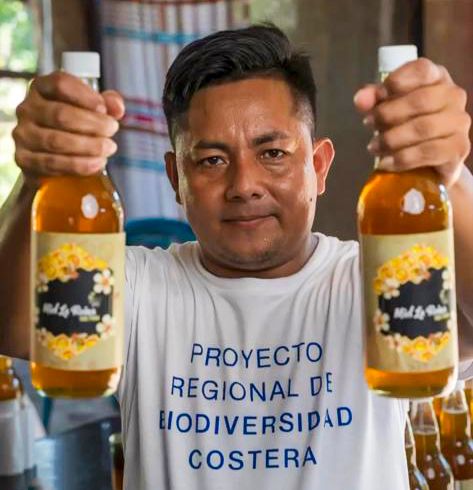 Stories
Stories
September 28, 2022 • 2 min read
Hector William Garcia, 35, and his family have been fishing for crab for years. Unfortunately, crab fishing, failed to provide a stable income.
For families like Hector’s seasonal work such as construction also helps to put food on the table, but with employment opportunities limited, the temptation to emigrate is ever present.
Things began to change for the better when Hector joined the Regional Coastal Biodiversity Project. The project promotes the development of beekeeping and honey production in coastal mangrove ecosystems in the Lower Basin of the Paz River in El Salvador. The project is financed by USAID and delivered by GOAL and the International Union for Conservation of Nature (IUCN).
As part of the project, families are trained to become beekeepers and honey-producers as a way to generate sustainable income. The beekeeping activities also help to protect local ecosystems, as bees then pollinate the local region.
Supporting Local Families and Ecosystems
With the beekeeping farms established, Hector and other participants were provided with technical and administrative training for the production and marketing of honey. During their training, they gained valuable knowledge on agribusiness management, protecting the local environment, and best beekeeping practices.
“At the beginning, it was difficult to identify the queen’s eggs or to diagnose how the hive is doing, but we have managed to do it thanks to the training we have received,” says Héctor.
The success of the project has encouraged Hector and his family to stay in their country. While helping to provide local communities with sustainable incomes the project is also having a huge environmental impact.

Hector displays the finished product
Reforested Areas Thriving
“The mangroves represent the livelihood for all the communities that live around the Santiago bar. Now the whole community works to take care of the ecosystem. Everything has improved – nobody cuts the plants; on the contrary, we have reforested mangrove areas that were previously degraded and today the mangroves are thriving,” Hector says.
Since 2020, with the support of funds from the Regional Coastal Biodiversity Project, the five local cooperatives in the region have established thriving apiaries (beekeeping farms). Honey is marketed locally, and in San Salvador, increasing incomes and improving wellbeing for local families.
Looking to the Future
Emigration once seemed their only option. But with his new business thriving Hector can now rely on a stable income to support his family. “Beekeeping represents a new alternative to generate income for our families. More than 50 families are now involved in this activity producing honey and looking forward to the future,” Hector says.
